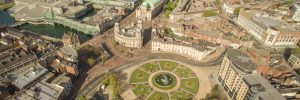
This project investigates how the memory and interpretation of defining historical episodes profoundly shape the politics, culture and physical environment of cities, through a case study of the legacy of the Blitz in Hull. The project uses oral and urban history methods to examine the interactions between urban space, civic identity and heritage, whilst shedding new light on contemporary debates over the centrality of the Blitz to British national identity. It has three main objectives:
- To examine how memory and placemaking shape the political, social and built fabric of cities and citizen’s identities, contributing to histories of urban politics, heritage and identity by engaging with citizens
- The creation of lasting impact through public engagement at a critical juncture for the city, leaving a collection of materials – working papers, oral histories and teaching aids – that can be accessed by anyone beyond the life of the project.
- To produce scholarship that contributes to heritage policy, conservation and memorialisation by examining the social value and meanings generated through the interactions of memory and urban space.
What Questions does the project ask?
- How has the memory of Hull’s wartime experiences inflected the politics, development and culture of the city?
- What other elements of Hull’s postwar history are crucial to how the people of Hull see the development and identity of the city?
- What civic identities and social values have been attached to different aspects of the built environment?
- How has the city’s status as a ‘forgotten’ element in the narrative of the national Blitz narrative shaped the relationship between Hull’s people, its local government, and central state?
- How can historicising the development of these narratives and identities be used to develop superior understandings of how redevelopment and planning decisions are made that account for heritage and conservation concerns?
How are we going to do this?
Engaging with the citizens of Hull is central to this project. Archives, newspapers and documentary evidence are a crucial part of the project, but Charlotte and James are going to be talking to as many people who live or have lived in Hull about the city, organising workshops and hosting and exhibition.
We want to speak to you and share your experiences and opinions.For details of how to get involved visit our Contacts page and follow us on our social media accounts.